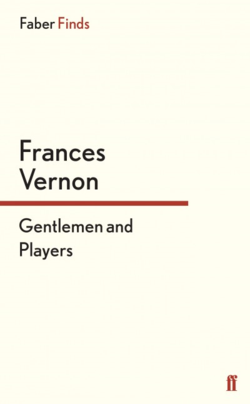
Have you ever heard of Frances Vernon? I certainly hadn't, until I came across her novels, recently rediscovered and published by Faber Finds. Born in 1963, she had published six novels before her tragically early death in 1991, aged just twenty-seven. Though never a best seller, she was consistently praised by the critics, and really deserves this revival. I've reviewed two of her other novels for the next issue of Shiny New Books, coming out at the end of this month, but I wanted to tell you about this one, which I enjoyed enormously.
Gentlemen and Players follows the lives of three sisters, Sarah, Susan and Sophie Pagett. Born in the 1850s, they are the daughters of a wealthy, widowed, self-made, man who, as the novel begins, is about to remarry, to Augusta Fitzwilliam, a woman of higher birth but lesser fortune. Augusta's social position enables the girls to come out into London society, which they do with varying degrees of enthusiasm and success. Sarah, the eldest, no beauty but flawlessly turned out, almost immediately, and delightedly, accepts a proposal from the middle-aged Lord Henry Templecombe, who her intelligent and practical sister Susan rightly decides is a rake. Susan herself, plump and pretty, ends up happily married to a country vicar who has previously carried on an intense flirtation with her younger sister Sophie. Sophie is the beauty of the family, and a tremendous flirt, but surprises everyone by turning down numerous apparently suitable proposals in favour of marriage to a relatively impecunious doctor.
So far so good, but is this just a skillful pastiche of a typical late-Victorian/early twentieth century novel? Absolutely not. Skilful it certainly is -- Vernon, who was just twenty when this, her second novel, was published, evidently immersed herself in the literature and history of the past and reproduces the language and context of the era without a single false note. But there's so much more going on here. As this, and the other three of her novels I've read, show, she is intensely interested in women's lives, their choices, their sexuality, and the pressures they suffer as a result of social expectations. Sarah, the most conventional and the least intelligent of the sisters, very quickly comes to regret her marriage to a man who was only after her money:
'Naturally at first I -- I thought him a dashing figure'. She squirmed. 'I wanted to be married and I wanted a title. One ought not to say that, no-one ever admits it, but that is the bold truth, Susan'. She was speaking more easily than she had since Susan's arrival.
'I see', said Susan.
'Only think how terrible it would be to be an old maid'. A new look came into her face. 'That is not what you want, is it, Susan? Only think'.
Susan, who had looked disturbed at Sarah's first comment, said, 'Better to be an old maid than unhappily married, don't you think?' and drew herself up. 'Is he unfaithful to you, Sarah?'
'Naturally he is. He always was'.
'It must hurt, even if you don't love him'.
'One's pride', said Sarah proudly, and shrugged. 'I am indifferent'.
Sarah's indifference gradually turns to real suffering, and she eventually separates from her husband, but her trajectory is a sad and painful one. Her sisters' less conventional marriages are more successful, though both suffer in their different ways from doubts, confusion, and anxieties.
I think perhaps the title provides an indication of what Vernon wanted to convey in this novel. The gentlemen certainly have a part to play, as suitor, lovers and husbands, but they are far less vividly brought to life than the real players, who are the women. Of the three sisters, perhaps the most interesting is Susan, whose life on the surface seems so uneventful compared to those of her two sisters, the unhappy Sarah and the flighty Sophie. Susan is wise and perceptive, and not afraid of speaking the truth even at the expense of hurting, shocking, or alienating her listeners.
A critic reviewing the novel at the time of its publication called it 'cool, precise, amused and amusing'. I've seen Vernon compared to Jane Austen, Barbara Pym, and Ivy Compton Burnett, but in my opinion she's not really all that much like any of them. She's her own woman, and all the more admirable for that. I've had huge pleasure in reading all of her first four novels, and plan to read the remaining two soon. Good for Faber for making them all available again.
